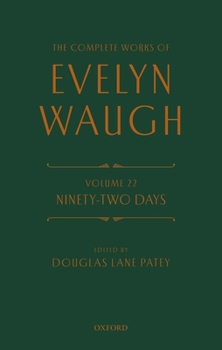Ninety-two Days: A Journey in Guiana and Brazil, 1932
Select Format
Select Condition 
Book Overview
This volume is part of the Complete Works of Evelyn Waugh critical edition, which brings together all Waugh's published and previously unpublished writings for the first time with comprehensive introductions and annotation, and a full account of each text's manuscript development and textual variants. The edition's General Editor is Alexander Waugh, Evelyn Waugh's grandson and editor of the twelve-volume Personal Writings sequence. This is the first fully annotated, critical edition of the travel book Ninety-Two Days (1934), Evelyn Waugh's account of an arduous journey through British Guiana and northern Brazil that provided crucial material for what many consider his finest novel, A Handful of Dust. A biographical and historical introduction places the work in the context of Waugh's life, and among other travel books written about the area; discusses how the text evolved from manuscript to print; and connects it with other literary works such as Arthur Conan Doyle's The Lost World, and with the persistent myth of the lost city of El Dorado.
Format:Hardcover
Language:English
ISBN:0198724187
ISBN13:9780198724186
Release Date:May 2021
Publisher:Oxford University Press
Length:416 Pages
Weight:1.32 lbs.
Dimensions:1.1" x 5.4" x 8.6"
Customer Reviews
1 rating
An accidental tourist in the kingdom of El Dorado
Published by Thriftbooks.com User , 25 years ago
From the first page to the last Waugh sweats his way around Guiana, a country he confesses early on he never even meant to visit, exuding contempt from every pore. It is unusual for a travel writer to show so much dislike for his chosen destination while still managing to carry his audience along with him. Partly this derives from Waugh's finely turned humour; partly the lack of foreknowledge most readers will have on such a rarely visited territory; and mainly from the succession of luminous characters that he bequeaths us to light the way along his lonely and fly-bitten road. Guyana is a fascinating place and occupies an important niche in British travel literature. Walter Ralegh's travelogue "The Discoverie of Guiana" is now recognised as being the first major modern English prose work, predating Bacon's "Essays", and there have been a steady stream of excellent and varied accounts ever since. Part of this fascination must stem from the long held assumption that Guiana was the kingdom of the legendary king "El Dorado"; certainly it was this that led Ralegh there in search of glory, and ultimately led him there again fatefully two decades later. Nevertheless the stamp of character of a country is a reflection of its people, and Guyana, as the former British colony is now called, has always borne such characters in abundance. As Waugh himself, Judge Henry Kirke ("25 Years In British Guiana"), Gerald Durrell ("Three Singles To Adventure"), Margaret Bacon ("Journey To Guyana") and, more recently, Pauline Melville ("The Ventriloquist's Tale") have discovered, they make for good reading. If Waugh is flawed in his approach, it is only that his unremitting negativity makes the reader wonder why he ever went there at all. Indeed, I am sure that Waugh asked himself the same question almost every day: it is significant that he chose to entitle his book after the duration of his visit, almost as if he was counting off every hour like beads on a rosary. Mea culpa, mea maxima culpa. Waugh professed to dislike his five travel books so intensely later in life that he asked they never be republished. And, with the exception of the compilation of excerpts "When The Going Was Good", they never were. Maybe he came to see his cynicism as a sin which for which subsequently he wished to atone in some manner. Thankfully his estate have been his confessors and allowed us, in their absolution, a singular glimpse into a rare country and a rare mind.





